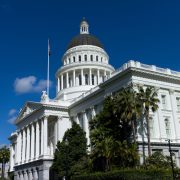SACRAMENTO – A controversial state Senate bill that would impose new taxes on California water customers is back in the legislative hopper after water agencies helped prevent its passage in 2017.
Senate Bill 623 (Monning) proposes taxing fertilizer, dairy products and water customers around the state to address groundwater pollution largely in agricultural regions of the state. If passed, the bill would impose a first-of-its-kind tax to raise as much as $160 million a year to fund safe drinking water projects in disadvantaged communities.
The legislation is opposed by water agencies, including the San Diego County Water Authority, as well as numerous stakeholder organizations such as the Association of California Water Agencies, California Municipal Utilities Association, and the League of California Cities.
Opponents say the bill violates the principle of “polluter pays” by forcing urban ratepayers to cover up to 85 percent of the cost. They believe more money for drinking water pollution cleanup should come from the agricultural and dairy industries, which would pay just 15 percent of the cost under SB 623.
Opponents are advocating for alternative revenue sources for cleanup work, for instance, money from the state’s general fund, federal safe drinking water funds, general obligation bond funds, and proposed assessments related to nitrates in groundwater.



